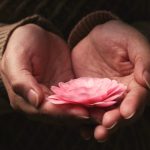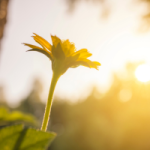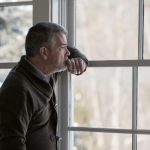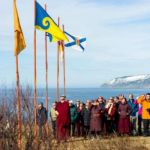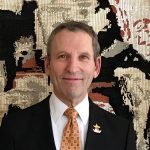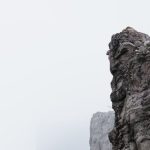Thursday
Buddhism, Psychedelic-Assisted Therapy and the Spiritual Path: An Interview with Dr. Sara Lewis
by Jillian Johnson
Register for the Buddhism, Psychedelic-Assisted Therapy and the Spiritual Path One-Day Retreat
One of the five main precepts in Buddhism is to avoid intoxicants, and it is clear that the use of substances can lead to spiritual bypassing. Yet many renowned practitioners in the West have talked openly about psychedelics as a catalyst to spiritual awakening that led them to the Dharma. Today, we sit down with Dr. Sara Lewis, co-founder of the Memoru Center for Visionary Healing Arts in Boulder, Colorado, and the Center for Psychedelic Studies at Naropa University, where she also served as an associate professor, and author of Spacious Minds: Trauma and Resilience in Tibetan Buddhism, to discuss the use of psychedelics in therapy and along one’s spiritual journey. In this interview, Sara provides us with her personal and professional perspective while considering how such practices may intersect, or not, with the Buddhist path.
Dr. Sara Lewis will hold an online mini-retreat, Buddhism, Psychedelic-Assisted Therapy and the Spiritual Path, through Shambhala Online on July 20, 2025. Click here to learn more and to register.
Jillian: Hi Dr. Lewis, thank you so much for being here with us today to share more about your work and knowledge in the field of psychotherapy and the implementation of psychedelics in mental health settings and spiritual pursuits.
Would you please tell us a little bit about your ‘why’ behind your work in mental health and how it expanded into the area of psychedelic-assisted therapy?
Dr. Lewis: I have long been interested in the mind: concepts of mind, the beauty and the challenges of the mind, and what it means to be human. As an anthropologist of religion and a psychotherapist, I am also deeply interested in how our connection to the divine changes across culture. In one way or another, I have been involved in the field of psychedelic studies for the last twenty years, yet it is more recent that psychedelic therapy has become more mainstream. As a Buddhist, I continue to see my clinical work as a skillful means to work with suffering in the world.
Jillian: How fascinating. We heard you opened a new clinic? Congratulations and please tell us more!
Dr. Lewis: Yes! Memoru Center for Visionary Healing Arts is a contemplative-based psychedelic training institute and community clinic where we offer legal psychedelic therapy. We can accept out of state clients who wish to travel to Colorado for a psilocybin experience. The Memoru clinic has a strong connection to Naropa University, where most of the cofounders have either worked as faculty or completed their studies.
Jillian: That’s very exciting, congratulations again! Speaking of legal psychedelic therapy, what do you feel are the current social and political climates surrounding the utilization of substances (primarily psilocybin and MDMA) in controlled mental health and spiritual settings? Are you noticing more or less acceptance in your typical day-to-day professional and personal interactions than in recent years?
Dr. Lewis: In general, there is a lot of interest and excitement for the therapeutic use of psychedelics. Many people understand that among veterans, abuse survivors, and others with PTSD, our standard treatments often fall short. As well, there is deep potential for plant medicines and psychedelics for those navigating the end of life. At Memoru, we will have a family program that aims to work with entire families–this might be when one person is at the end-of-life, navigating the post-partum period after birth, couples work, or a veteran returning home. When psychedelic care is done in a way that is slow, intentional and safe, I think there is significant support. At the same time, our basic health care infrastructure is not really set up to easily make this type of work accessible. Psychedelics do not fit easily into a capitalist system and without sounding too conspiratorial, the global Big Pharma system has many reasons to hinder the kind of paradigm shift many of us interested in psychedelic-assisted therapy are hoping for. Still, I believe that most of us yearn for change. With psilocybin now legal in various capacities in Oregon, Colorado and most recently, New Mexico, I believe in the next 5-10 years we will see a significant shift in accessibility of these modalities in North America and around the globe.
Jillian: Thank you so much for this thoughtful response, Sara. It is comforting to know that all areas of support are being explored for those seeking treatment and their families. Do you feel momentum and public support will eventually result in the integration of psychedelics into mainstream healthcare?
Dr. Lewis: Absolutely. And this could go the other direction as well if we do not take seriously the ethical responsibility to work with these medicines in a safe way. Many cultures across the world understand plant medicines to be living beings with sentience. They shouldn’t be “taken” in an extractive way. If we can relate with the cultures ethically who are stewards of these medicines, and collaborate and learn from them, I think we may have good results. For society as a whole to open up to them, I think we are in a critical period of needing to demonstrate that as a human society we can be trusted with these powerful agents. It’s up to us! But I feel the plants and fungi also want to help.
Jillian: I love your statement “…I feel the pants and fungi also want to help” and the care you show towards our Plantae and Fungi kingdoms. Have you noticed an increase in the number of patients and clients willing to consider psychedelics as part of their treatment plan for depression, anxiety, addiction, PTSD, etc.?
Dr. Lewis: Yes, very much so. Many people have earnestly tried conventional therapies without much relief. There are also many people seeking to work with suffering within the human condition in a way that honors and deepens their spiritual path. So there’s sort of a question about whether the work is “mental health work,” “spiritual work,” or something else. There is also a lot of joy, beauty and connection, something that may not be fully honored in a traditional treatment plan that tends to focus rather narrowly on the eradication of symptoms.
Jillian: It sounds like a very integrative approach that is catered to each individual’s unique needs and requirements, which is still lacking in many areas of healthcare. Would you tell us more about a situation(s) where the assistance of psychedelics, in a therapeutic application, aided a client in a breakthrough (mental, emotional and/or spiritual) that may not have occurred, or may have taken longer to occur, with more traditional mental health practices? Are you able to expand on the experience, at least from your perspective, and how that felt?
Dr. Lewis: I have had so many clients with intergenerational and ancestral experiences, even when they weren’t necessarily seeking that out. This has looked like deeply experiencing and seeing the ways that an ancestral burden has been passed down through the ages, visitations from elders who have passed, and sometimes a deep experience of connection and homecoming into one’s ancestral lineage. This happens so frequently that I myself, have embarked on a formal process of Ancestral Lineage Healing over the past year to better learn to work with my own spiritual lines. We will have more on this in the mini-retreat!
Jillian: This sounds not only incredibly interesting, but heart-warming as well. What a beautiful experience for both you and your clients. I am intrigued to hear more at the mini-retreat! In which situation(s) do you recommend someone not take psychedelics or partake in psychedelic-assisted therapy if it is a path they are interested in pursuing for their mental health and/or spiritual journey?
Dr. Lewis: These agents can be very powerful and it’s important to know if it’s the right time. I receive many referrals for people who have had negative even traumatic experiences resulting from psychedelics. Beyond contraindicated conditions like psychosis and mania (though even those who have these histories may be able to work in psychedelics under certain conditions), I wouldn’t recommend jumping into working with them if things aren’t stable enough to be able to accommodate potentially big and sometimes disruptive shifts. Sometimes these medicines work through disruption and dissolving: this could be to harmful patterns, misperceptions, ego-clinging, itself, or even the dissolving of relationships, career or other major disruptions.
Jillian: This is a very strong point to consider. Thank you for mentioning ‘being ready’ for shifts. While it is often said “The only constant change,” it is important to remember to be as grounded as possible before inviting a powerful catalyst for said change. What would you recommend as some of the “should” and “should nots” before holding a psychedelic session in terms of choosing an appropriate environment, monitoring one’s current mental state, integrating other practitioners and/or professionals, etc.? In a sense, what would you recommend in terms of setting yourself up for an enlightening experience?
Dr. Lewis: Most people do not need to work with a psychedelic therapist or clinician to have a safe and meaningful experience. This was recognized in the state of Colorado that has approved personal use of psilocybin mushrooms for anyone 21 years and over. Colorado also allows for individuals to embark on training as facilitators who do not hold a clinical license, again recognizing that many people can be trained to hold space for someone else ethically and with care. However, if the intention is really to engage in therapeutic work, it would be important to seek out a trained and licensed clinician. Sometimes it can be hard to really discern whether the work is “therapeutic” or whether it is “spiritual.” But this isn’t a new problem. Many cultures around the world do not separate the paths of healing and spirituality. What is most important is to feel that the setting and the practitioner is slow, intentional, and rooted in some kind of practice lineage. I would not get involved with anyone who doesn’t seem to have any mentors, elders, or community of accountability.
Jillian: Very true, consistent and quality integrative care that takes into account physical, mental, spiritual, and emotional health of an individual is a hurdle that seems to continually appear, at least in American culture. On a more casual note, if you were talking freely (perhaps in a bar) to a captivated audience, what would your elevator pitch be when introducing a metaphysical discussion on the topic of psychedelics in therapy or on one’s spiritual journey?
Dr. Lewis: I probably wouldn’t make one. A person really needs to feel the call, so to speak, on their own! If you listen and hear the call, however, many of us all across the globe would love nothing more than to dive into that conversation!
Jillian: What a conscientious approach. Wait for the invitation. And now for our final interview question, what has the use of psychedelics done for your personal spiritual growth? Do you have any stories you’re willing to share with us?
Dr. Lewis: Yes, but I will save these for the mini-retreat. Hope you can join!
Thank you, Sara, we’re looking forward to it! Myself and Shambhala Online thank you for taking the time to answer our questions about these exciting advances in patient/client care. You have touched on many dynamic aspects regarding the use of psychedelics in client care and we are eager to dive deeper on July 20!
Dr. Sara Lewis is Co-founder of Memoru Center for Visionary Healing Arts, a psychedelic clinic and training institute in Boulder, Colorado. She served as Associate Professor at Naropa University in Buddhist-Informed Counseling, where she also co-founded the Center for Psychedelic Studies. Sara is author of Spacious Minds: Trauma and Resilience in Tibetan Buddhism, an ethnographic study of mind, memory and recovery from collective trauma in the Tibetan exile community. She teaches in Shambhala on the topic of Buddhism and psychedelics, and has also served in a number of leadership roles, including a term on the Interim Shambhala Board.
Entries filed under Community Articles
In Loving Memory of Alice Haspray – HIGHLIGHT
From the Chronicles of Chögyam Trungpa Rinpoche By The Chronicles – August 22, 2024 Alice Haspray, Halifax, Nova Scotia Alice Haspray, beloved wife of Richard, mother of Noah, grandmother of Oscar, and teacher of many of us, passed from this life on Tuesday, August 20, 2024 at 5:45 PM ... continuePosted August 30, 2024 by Jillian_Johnson
Meditation for Self-Love: Teachings, Videos, and Guided Meditation Script – HIGHLIGHT
By Frederick Meyer Shambhala Blog Article, August 9, 2024 Self-love—to feel, honor, and appreciate our own goodness—is among the most beautiful and powerful things there is. We are always worthy of self-love, but because of the difficulties of life, we may struggle to find it. Fortunately, meditation can ... continuePosted August 16, 2024 by Jillian_Johnson
Compassion vs. Empathy: Understanding the Difference – HIGHLIGHT
By John Seex The terms “empathy” and “compassion” are often used interchangeably, but from a Buddhist perspective ultimately they are very different. In this article, we’ll explore compassion and empathy, the place and value of each, and the core differences between compassion vs. empathy. Let’s start by looking ... continuePosted July 30, 2024 by Jillian_Johnson
Tender Confidence – HIGHLIGHT
A Personal Account of My Weekthun Retreat at Drala Mountain Center by Eric Bergstrom Confess your hidden faults. Approach What you find repulsive. Help those you think you cannot help. Anything you are attached to, let it go. Go to places that scare you. –Machik Labdron I was headed to Drala Mountain center in ... continuePosted July 5, 2024 by Jillian_Johnson
Eco-Dharma Talk Series: Exploring Where a Mindful Life and Ecology Meet – HIGHLIGHT
A Shambhala Online Interview with Touching the Earth Collective Shambhala Online spoke with Gregory Webster and Irene Woodard from Shambhala Touching the Earth Collective and asked them several questions about the upcoming Eco-Dharma Series being held July 16-20, 2024. The Eco-Dharma Talk Series: Exploring Where a Mindful ... continuePosted June 11, 2024 by Jillian_Johnson
The Grieving Heart: Slow Down & Feel It – HIGHLIGHT
By Alley Smith We can deny its existence, but grief is patient and waits as long as we have the energy to ignore it. Timothy G. Serban Over the years I have heard it said that every person needs to tell their story of loss and grief. This enables individuals to ... continuePosted May 29, 2024 by Jillian_Johnson
Making Friends with Death and Dying: A Spiritual Journey – HIGHLIGHT
By Alley Smith The genuine heart of sadness comes from feeling that your nonexistent heart is full. You would like to spill your heart’s blood, give your heart to others. For the warrior, this experience of sad and tender heart is what gives birth to fearlessness. —Chögyam Trungpa ... continuePosted May 1, 2024 by Jillian_Johnson
Meeting Chenrezig in Sound: Understanding Chenrezig’s Name and the Meaning of the Chenrezig Mantra – HIGHLIGHT
by Frederick Meyer An excerpt from the Shambhala Online Blog posted April 12, 2024 In recent years, Chenrezig—the Tibetan name for the Buddhist deity Avalokiteshvara, the Bodhisattva of compassion—has become an important part of my spiritual practice. I have a strong affinity for sound, and much of my ... continuePosted April 23, 2024 by Jillian_Johnson
Precious Silence – The Gift of Retreat – HIGHLIGHT
A Message from the Director and Team at Gampo Abbey and the April 2024 Gampo Abbey Newsletter Photo: Beginning the Yarne retreat full circumambulation of the vihara on a very windy cold day. As I write this we are in the final days of the Yarne retreat – ... continuePosted April 12, 2024 by Jillian_Johnson
Gratitude for Human Resource – HIGHLIGHT
An Excerpt from the March 2024 Shambhala Touching the Earth Collective Newsletter by Irene Woodard There is a group of us in the Collective studying Joanna Macy’s Active Hope. And the start of her spiral is gratitude. And so this is coming from that place, where someone has been so important ... continuePosted March 21, 2024 by Jillian_Johnson
Mindful Parenting: How Parenting and Mindfulness Practice Can Support Each Other – HIGHLIGHT
By Sean McCann An Excerpt from the Shambhala Online Community Blog Mindful parenting is a rich and multifaceted topic. How can mindfulness inform our parenting? And how does parenting affect our mindfulness and meditation practice? In this article, we’ll look at three related questions: How mindfulness and meditation can support ... continuePosted March 12, 2024 by Jillian_Johnson
Sun Ceremony – HIGHLIGHT
by Emily Takahashi An Excerpt from the Shambhala Touching the Earth Collective March Newsletter For a recent Touching the Earth Salon, I was asked to share a little about a practice I did over the course of one year, 365 days in succession. In November 2020 I took an ... continuePosted March 7, 2024 by Jillian_Johnson
Buddhism on Fear: How to Practice Meditation for Fear and Anxiety – HIGHLIGHT
An Excerpt from the Shambhala Blog by Kathleen Walls Much of the suffering in our lives is rooted in fear. Fortunately, Buddhism and meditation offer excellent supports for working with fear—and with anxiety, the worry about uncertain threats that many of us carry in contemporary life. Fear is pervasive, ... continuePosted February 27, 2024 by Jillian_Johnson
Shambhala Day Live Broadcast – HIGHLIGHT
Entering Into the Year of the Wood Dragon Shambhala Day was on Feb 10 this year and hundreds of people from around the world joined together at Shambhala Centres, Groups, and the homes of family and friends to watch the Shambhala Day Live Broadcast and welcome in the Year of ... continuePosted February 22, 2024 by Jillian_Johnson
Year of the Wood Dragon – HIGHLIGHT
Shambhala Touching the Earth Collective February 2024 Newsletter In preparing for the upcoming Wood Dragon year, the Steering Committee has created a document of agreed upon goals…But as we have learned in the last few years, things change, oh my oh my. We are already off to an unimagined ... continuePosted February 6, 2024 by Jillian_Johnson
![]() RSS feed for the Community Articles category
RSS feed for the Community Articles category
View all posts from authors in Community Articles: jillian_johnson









